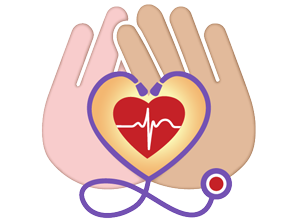Excerpts from Dr. O’Hara’s presentation at the New Solutions Conference on Meditation, Trauma, Resilience and the Brain, Washington, D.C. Oct 20,2021
“Dr. O’Hara’s talk was superb…. very powerful and at the same time personal. Her participation was instrumental to making the Conference a success.”
Stuart Rothenberg, MD,
Chief Medical Officer, David Lynch Foundation,
National Director, TM Health Professionals Association
When I look back on the beginnings of my career, there’s been years of study, almost a decade of training, debt accumulation and loan repayment, life’s adversities as well as celebrations, sleep deprivation, little appreciation, over-working, limited sense of accomplishment, and probably foremost top of the list—accumulated sadness for my suffering patients–In other words, what’s called compassion—caring for another’s suffering with a desire to lessen it. Yet holding onto others’ suffering from countless exposures at work, was creating secondary trauma within me.
I hit a crossroads. I was never comfortable prioritizing my own wellbeing, in fact it seemed frowned upon. I was raised where the needs of others came first, and frankly, that made me perfect for a career in medicine. Yet my focus changed when I learned to meditate.
My mediation practice began as what I called a “covert operation”—I chose to attend a medical conference, all very acceptable, but this conference was different. It was a mind body medicine conference at Harvard way back when there were only 80 of us getting to know each other and ourselves in this work, as opposed to 450 with a waitlist when I returned for a refresher in more recent years. We were taught, through experiential practice, a few different meditation techniques.
At the time, due to stressors in my life, I started experiencing severe back pain, to the degree it was somedays hard to walk. It was one of those days, when I chose my path of wellness, and turned away from the path of pain. In that moment, I called out for support, and no one answered– they just weren’t home to pick up the phone. So I sat in meditation with the techniques I had just learned, and it worked. And over time I healed.
I’m a child abuse pediatrician, and my role is to show up when there’s concern a child is being abused or maltreated. I inform medical management and testify on behalf of these children when I am called upon to do so. It wasn’t long into my career that I learned, facing traumatized youth and teens, the limitations of Western traditional medicine to heal and cure. Traditional disease-based approaches with diagnosis and treatment seemed often ineffective for long-term change. Integrative practices that address the whole patient and empower parents and youth and give THEM the tools to even heal themselves seemed essential, to transform trauma into resiliency.
For traumatized youth, I learned in my career that we need to go all-in, and not feel limited with what we can offer. I also learned for myself as a physician, when I faced something difficult in my work, like an autopsy or a crying parent, I needed to learn how to go all-in and stay fully present. I was mediating everyday by then for years, but came to realize the amount of effort I was putting into it, and I was exhausted. As a yogi, I turned to the ancient text of the Yoga Sutras, which remind us the way to move forward is not with force or excess effort but to learn how to let go. It was in this “a ha” moment that I went straight to Transcendental Meditation (TM). After concentrating with focus for so long, I was drawn to the effortless nature of TM. I wanted a “deal-breaker” and I found it. It was Memorial Day weekend 4 years ago when I trained in TM. I called it my “staycation” with intention to invest a little in myself, as I came to know I’m worth it. It was all I had imagined and more. The personalized ritual tapped into something unique in me, and I began to feel more expansion and less resistance right away. There was no pressure to stop thoughts but rather accept them as a natural part of the process, and simply without effort, return to the mantra.
What I came to learn for myself, I came to want for my patients. Although mandated reports for child maltreatment were down during the pandemic,1 rates of emotional abuse, neglect, and domestic violence have risen,2 and those who did present to medical care with physical abuse had more severe injury.3 Yes, teens could stay home alone during school shutdowns, but we lost sight of them, leaving many child abuse doctors worried about under-reporting with kids under the radar staying home. Teenage anxiety, depression, and suicidality have escalated to alarming rates.4 According to Dr. Sallie Permar and Dr. Jordan Orange, Chairs of the Departments of Pediatrics at Weill Cornell Medicine and Columbia University Vagelos College of Physicians and Surgeons, sharing their opinion in STAT, “It’s time to stand up for children, who have been pushed aside since the response to the pandemic began.”5 How can we stand up for youth and teens after their “lost year” during such a pivotal time in their development? We must go all-in with all the promising tools we have, including evidence-informed integrative practices, such as meditation, yoga, and mindfulness, among others, that have been shown in randomized controlled trials and other studies to decrease anxiety and depression and increase resilience in both teens and adults. – exactly what we need at this time in history.6-12
Promising integrative practices can help us and those we serve, in even more immeasurable ways, be it in medicine, law, business, or any field that involves human interaction and engagement:
They help address gaps and limitations by offering more tools with depth of practice that empower the individual to take charge of their own healing—which is essential to treating trauma which is rooted in an experience of disempowerment.
They help us maintain presence, no matter what we’re facing, be it sorrow or joy, thus greatly informing our own wellness by not missing the “little things” that inform purpose and meaning in our work.
They help us show up with compassion. Feeling compassion, including self-compassion, has the power to shift positive change, and the power to heal, proven by neuroscience to release neurotransmitters and alter brain waves to promote calm and prosocial connection.
Together, let’s shift our priorities – toward more research, practice, and dedicated time in the workplace for promising integrative practices–for ourselves, for medical providers world-wide, and for our patients.
One way to begin is with your own self-practice, and build a vision of what you wish to bring to your work, and what you wish to leave behind. And maybe show up for your practice with that vision, and allow your truest nature and greatest contribution unfold.
Mandy O’Hara, MD, MPH, TCTSY-F, FAAP
Some References:
Whelan J, Hartwell M, Chesher T, Coffey S, Hendrix AD, Passmore SJ, Baxter MA, den Harder M, Greiner B. Deviations in criminal filings of child abuse and neglect during COVID-19 from forecasted models: An analysis of the state of Oklahoma, USA. Child Abuse Negl. 2021 Jun;116(Pt 2):104863. doi: 10.1016/j.chiabu.2020.104863. Epub 2020 Dec 6. PMID: 33298325; PMCID: PMC8446923.
Sharma S, Wong D, Schomberg J, Knudsen-Robbins C, Gibbs D, Berkowitz C, Heyming T. COVID-19: Differences in sentinel injury and child abuse reporting during a pandemic. Child Abuse Negl. 2021 Jun; 116(Pt 2):104990. doi: 10.1016/j.chiabu.2021.104990. Epub 2021 Mar 8. PMID: 33707071.
De Boer C, Ghomrawi HM, Bouchard ME, Linton SC, Tian Y, Abdullah F. Effect of the COVID-19 pandemic on presentation and severity of traumatic injury due to physical child abuse across US children’s hospitals. J Pediatr Surg. 2021 Jul 8:S0022-3468(21)00486-3. doi: 10.1016/j.jpedsurg.2021.06.014. Epub ahead of print. PMID: 34334186.
Wang X, Hegde S, Son C, Keller B, Smith A, Sasangohar F. Investigating Mental Health of US College Students During the COVID-19 Pandemic: Cross-Sectional Survey Study. J Med Internet Res. 2020 Sep 17;22(9):e22817. doi: 10.2196/22817. PMID: 32897868; PMCID: PMC7505693.
https://www.statnews.com/2021/08/24/as-delta-spreads-put-childrens-health-first/
Wendt, S., Hipps, J., Abrams, A. et al. Practicing Transcendental Meditation in High Schools: Relationship to Well-being and Academic Achievement Among Students. Contemp School Psychol 19, 312–319 (2015). https://doi.org/10.1007/s40688-015-0066-6
Bandy, C.L., Dillbeck, M.C., Sezibera, V., & Taljaard, L. Reduction of PTSD in South African University Students Using Transcendental Meditation Practice. Psychological Reports (0) 0: 1-16 (2019).
Bleasdale, J.E., Peterson, M.C., & Nidich S. Effect of Meditation on Social/Emotional Well-Being in a High-Performing High School. Professional School Counseling 23(1): 1-8 (2020).
Nidich SI, Rainforth MV, Haaga DA, Hagelin J, Salerno JW, Travis F, Tanner M, Gaylord-King C, Grosswald S, Schneider RH. A randomized controlled trial on effects of the Transcendental Meditation program on blood pressure, psychological distress, and coping in young adults. Am J Hypertens. 2009 Dec;22(12):1326-31. doi: 10.1038/ajh.2009.184. Epub 2009 Oct 1. PMID: 19798037; PMCID: PMC3128829.
Khalsa, M.K., Greiner-Ferris, J.M., Hoffman, S.G., & Khalsa, S. B. Yoga-enhanced CBT for anxiety management: a pilot study. Clinical Psychology and Psychotherapy 22(4), 364-371 (2015).
van der Kolk BA, Stone L, West J, Rhodes A, Emerson D, Suvak M, Spinazzola J. Yoga as an adjunctive treatment for posttraumatic stress disorder: a randomized controlled trial. J Clin Psychiatry. 2014 Jun;75(6):e559-65. doi: 10.4088/JCP.13m08561. PMID: 25004196.
Nguyen-Feng, V. N., Hodgdon, H., Emerson, D., Silverberg, R., & Clark, C. J. (2020, August 27). Moderators of Treatment Efficacy in a Randomized Controlled Trial of Trauma-Sensitive Yoga as an Adjunctive Treatment for Posttraumatic Stress Disorder. Psychological Trauma: Theory, Research, Practice, and Policy. Advance online publication. http://dx.doi.org/10.1037/tra0000963

